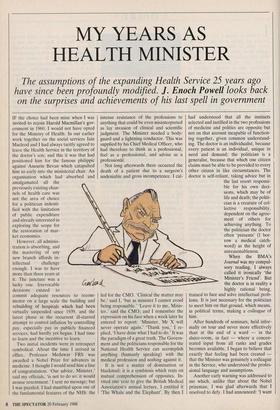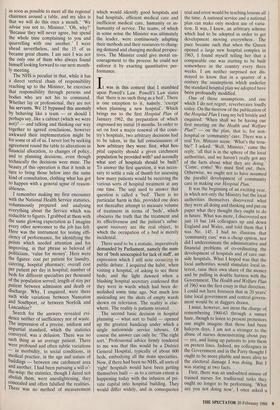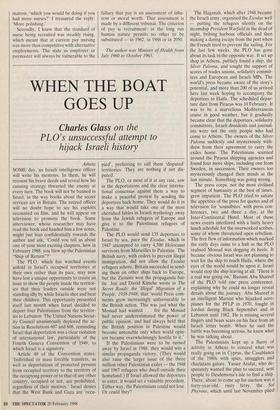MY YEARS AS HEALTH MINISTER
The assumptions of the expanding Health Service 25 years ago
have since been profoundly modified. J. Enoch Powell looks back
on the surprises and achievements of his last spell in government
IF the choice had been mine when I was invited to rejoin Harold Macmillan's gov- ernment in 1960, I would not have opted for the Ministry of Health. In our earlier work together on the social services lain Macleod and I had always tacitly agreed to leave the Health Service in the territory of the doctor's son; and this it was that had positioned him for the famous philippic against Aneurin Bevan which catapulted him so early into the ministerial chair. An organisation which had absorbed and amalgamated all the previously existing chan- nels of health care was not the area of choice for a politician indenti- fied with the limitation of public expenditure and already interested in exploring the scope for the restoration of mar- ket economics.
However, all adminis- tration is absorbing, and the mastering of any new branch affords in- tellectual challenge enough. I was to have more than three years at it. The juncture was a lucky one. Irrevocable decisions existed to commit adequate resources to recom- mence on a large scale the building and rebuilding of hospitals which had been virtually suspended since 1939, and the latest phase in the recurrent ill-starred attempt to control inflation by controlling pay, especially pay in publicly financed services, had hardly yet begun. I had time to learn and the incentive to learn.
Two initial incidents were in retrospect symbolical. About the time I arrived in office, Professor Medawar FRS was awarded a Nobel Prize for advances in medicine. I thought I would send him a line of congratulation. 'Our advice, Minister,' said my officials, 'is not to do so: it would arouse resentment.' I sent no message; but I was puzzled. I had stumbled upon one of the fundamental features of the NHS: the intense resistance of the professions to anything that could be even misinterpreted as lay invasion of clinical and scientific judgment. The Minister needed a body- guard and a lightning conductor. This was supplied by his Chief Medical Officer, who had therefore to think as a professional, feel as a professional, and advise as a professional.
Not long afterwards there occurred the death of a patient due to a surgeon's undeniable and gross incompetence. I cal- led for the CMO. 'Clinical the matter may be,' said I, tut as minister I cannot avoid being responsible.' Leave it to me, Minis- ter,' said the CMO; and I remember the expression on his face when a week later he entered to report: 'Minister, Mr X will never operate again.' Thank you,' I re- plied, 'I have done what I had to do.' It was the paradigm of a great truth. The Govern- ment and the politicians responsible for the National Health Service can accomplish anything (humanly speaking) with the medical profession and nothing against it.
It is not a matter of domination or blackmail: it is a symbiosis which rests on mutual comprehension of opposites. In- vited one year to give the British Medical Association's annual lecture, I entitled it `The Whale and the Elephant'. By then I After hundreds of seminars, held infor- mally on tour and never more effectively than at the end of a ward — in the sluice-room, in fact — where a concen- trated input from all ranks and grades becomes available, I began to believe that exactly that feeling had been created that the Minister was genuinely a colleague in the Service, who understood the profes- sional language and assumptions.
Another early warning was addressed to me which, unlike that about the Nobel prizeman, I was glad afterwards that I resolved to defy. I had announced: 'I want as soon as possible to meet all the regional chairmen around a table, and my idea is that we will do this once a month.' We advise you not to, Minister."Oh, why?' `Because they will never agree, but spend the whole time complaining to you and quarrelling with one another.' I went ahead nevertheless, and the 15 of us became great chums. I am sure I was not the only one of them who always found himself looking forward to our next month- ly meeting.
The NHS is peculiar in that, while it has a direct vertical chain of responsibility reaching up to the Minister, he exercises that responsibility through persons and bodies who are not his to command. Whether lay or professional, they are not his servants. We 15 bypassed this anomaly by behaving like a team — or should I perhaps say, like a cabinet (which we were not)? — and talking and thinking our way together to agreed conclusions, however awkward their implementation might be for some or all of us. I never lost by seeking agreement round the table to alterations in financial allocation, to changes of policy, and to planning decisions, even though technically the decisions were mine. The beauty pf this operation is that it tends in turn to bring those below into the same kind of consultation, clothing what has got to happen with a general sense of reason- ableness.
I remember making my first encounter with the National Health Service statistics, voluminously prepared and analysing everything about the Service which was reducible to figures. I grabbed at them with the same glowing expectation as I imagine every other newcomer to the job has felt. Here was the instrument for testing effi- ciency of performance, for identifying the points which needed attention and for Improving, in that phrase so beloved of politicians, 'value for money'. Here were the figures: cost per patient for laundry, catering, hospital pharmacy; overall cost per patient per day in hospital; number of beds for different specialties per thousand of the population served; length of stay per patient between admission and death or discharge. Why, I enquired, were there such wide variations between Nuneaton and Southport, or between Norfolk and Lancashire?
Search for the answers revealed evi- dence neither of inefficiency nor of waste. The impression of a precise, uniform and Impartial standard, which the statistics conveyed, was a delusion. There was no such thing as an average patient. There were profound and often subtle variations — in morbidity, in social conditions, in medical practice, in the age and nature of buildings — between one catchment area and another. I had been pursuing a will-o'- the-wisp: the statistics, though I dared not abolish them, were unenlightening, they Concealed and often falsified the realities. There was no method of measurement which would identify good hospitals and bad hospitals, efficient medical care and inefficient medical care, humanity or in- humanity of service. The teams, of which in some sense the Minister was ultimately the leader, were continuously adapting their methods and their resources to chang- ing demand and changing medical perspec- tives. The Minister could give moral en- couragement to the process: he could not enforce it by exacting quantitative per- formance.
It was in this context that I stumbled upon Powell's Law. Powell's Law states that 'there is no such thing as a bed'. There is one exception to it, namely, 'except when planning a new hospital'. Which brings me to the first Hospital Plan of January 1962, the preparation of which engrossed my initial 18 months. In order to set on foot a major renewal of the coun- try's hospitals, two arbitrary decisions had to be taken, in the full consciousness of how arbitrary they were: first, what hos- pital capacity should a given catchment population be provided with? and secondly what sort of hospitals should be built?
To answer the first question, it was neces- sary to settle a rule of thumb for assessing how many patients would be receiving the various sorts of hospital treatment at any one time. The unit used to answer that question is called a 'bed'. There is no particular harm in this, provided one does not thereafter attempt to measure volume of treatment in terms of 'beds', which obscures the truth that the treatment and its effectiveness and the patient's subse- quent recovery are the real object, to which the occupation of a bed is merely incidental.
There used to be a statistic, imperatively demanded by Parliament, namely the num- ber of 'beds unoccupied for lack of staff , an expression which I still note occu► '-‘,1 in public debate. I acquired the habit, when visiting a hospital, of asking to see these beds; and the light dawned when a blushing hospital secretary confessed that they were in wards which had been de- molished some time ago. Not much less misleading are the shots of empty wards shown on television. The reality is else- where. The reality is patients treated.
The second basic decision in hospital planning — what sort to build — opened up the greatest handicap under which a single nationwide service labours. Of course the answer can only be: 'The right sort.' Professional advice firmly tendered to me was that this would be a District General Hospital, typically of about 600 beds, embodying all the main specialties. Now, if there had been no NHS, all sorts of `right' hospitals would have been getting themselves built — as to a certain extent is happening today with the infusion of pri- vate capital into hospital building. They would differ widely, and in consequence trial and error would be teaching lessons all the time. A national service and a national plan can make only modest use of varia- tion. It was, I knew, an arbitrary scheme which had to be adopted in order to get development moving everywhere. The pace became such that when the Queen opened a large new hospital complex in 1963, I found myself telling her that a comparable one was starting to be built somewhere in the country every three weeks. I am neither surprised nor dis- mayed to know that in a quarter of a century the assumptions which underlay the standard hospital plan we adopted have been profoundly modified.
One of those assumptions, and one which I do not regret, reverberates loudly today. On the morrow of the publication of the Hospital Plan I rang my bell briskly and enquired: 'When shall we be having our first meeting on the Health and Welfare Plan?' — on the plan, that is, for non- hospital or 'community' care. There was a real Yes, Minister scene. 'What's the trou- ble?' I asked. 'Well, Minister,' came the reply, 'all that is in the sphere of the local authorities, and we haven't really got any of the facts about what they are doing.' `Come, come! We must find out, then. Otherwise, we ought not to have assumed the parallel development of community care in making our Hospital Plan.'
It was the beginning of an exciting year, in which not only the Ministry but the local authorities themselves discovered what they were all doing and thinking and put on paper what they thought they ought to do in future. What was more, I discovered not just 14 but 144 colleagues up and down England and Wales, and told them that I was No. 145. I had no illusions that `community care' was a cheap option, nor did I underestimate the administrative and financial problems of co-ordinating the development of hospitals and of care out- side hospitals. What I hoped was that the local authorities would stimulate local in- terest, raise their own share of the money and be pulling in double harness with the Government. The Health and Welfare Plan of 1963 was the first essay in that direction. I could not have foreseen that in 20 years' time local government and central govern- ment would be at daggers drawn.
I must, however, not incur the charge of remembering 1960-63 through a sunset haze, though to listen to present protestors one might imagine that those had been halcyon days. I am not a stranger to the abuse of nurses demonstrating about pay — yes, and lining up patients to join them on protest lines. Indeed, my colleagues in the Government and in the Party thought I ought to be more pliable and more alive to the electoral damage I was doing. But I was staring at two facts.
First, there was an undoubted misuse of trained nurses for traditional tasks they ought no longer to be performing. 'What are you not doing now', I once asked a matron, 'which you would be doing if you had more nurses?' I treasured the reply: 'More polishing.'
Secondly, I knew that the standard of nurse being recruited was steadily rising, which meant that at current pay nursing was more than competitive with alternative employments. The state as employer or paymaster will always be vulnerable to the fallacy that pay is an assessment of inhe- rent or moral worth. That assessment is made by a different tribunal. The criterion of pay is recruitment: in the long run human nature permits no other to be substituted — in 1962, in 1988 or in 2050.
The author was Minister of Health from July 1960 to October 1963.




















































 Previous page
Previous page